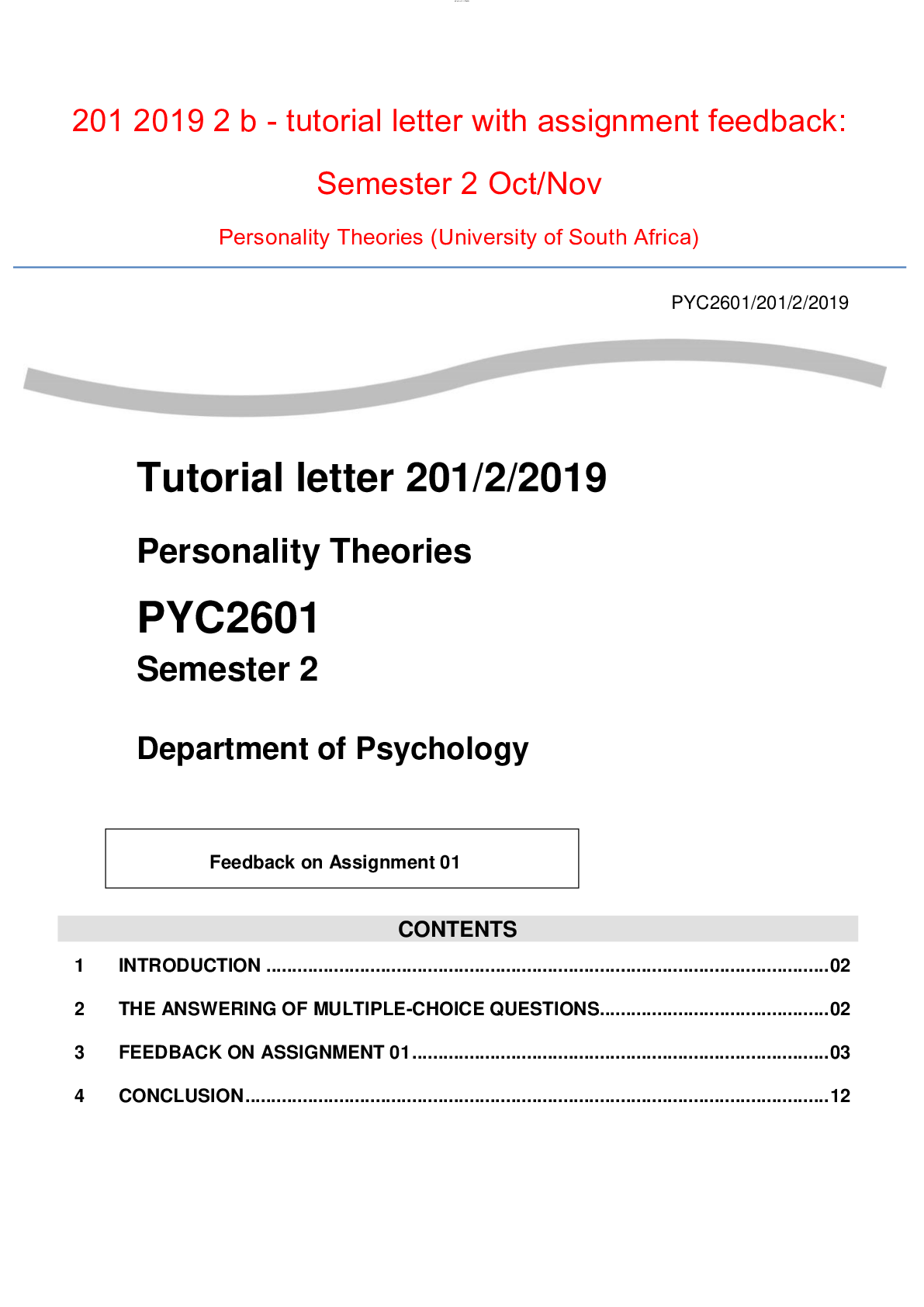Psychology > EXAM > 202 2019 2 b - Tutorial letter with assignment feedback Semester 2 Oct/Nov Personality Theories (Uni (All)
202 2019 2 b - Tutorial letter with assignment feedback Semester 2 Oct/Nov Personality Theories (University of South Africa)
Document Content and Description Below
202 2019 2 b - Tutorial letter with assignment feedback Semester 2 Oct/Nov Personality Theories (University of South Africa) PYC2601/202/2/2019 Tutorial letter 202/2/2019 Personality Theor... ies PYC2601 Semester 2 Department of Psychology 1 INTRODUCTION 2 2 FEEDBACK ON ASSIGNMENT 02 2 Dear Student In this tutorial letter, we will discuss the following: Feedback on Assignment 02 2.1 General comments on Assignment 02 We were pleased that many students submitted Assignment 02. The aim of Assignment 02 was to help students to work through the second part of the syllabus. Students who submitted Assignment 02 will receive a computer printout containing the following information: a) The correct answers b) Your own answers and c) The mark you obtained. If you submitted your assignment on time and have not yet received such a printout, please contact our Assignment Section by email assign@unisa.ac.za or send a sms to 43584. You will find a summary of the correct answers of Assignment 02 in Table 1. IMPORTANT NOTICE: Please be reminded that, as per the announcements placed on MyUnisa, students using the 5th edition of the prescribed book MUST NOT study the chapter on the African Perspectives as it appears in the 5th edition. The prescribed chapter for the African Perspectives is the chapter from the 4th edition of the prescribed book and must be prepared for examination purposes. The 4th edition chapter on the African Perspectives is available as a PDF document in the Additional Resources folder on the PYC2601 module page on MyUnisa. 2 PYC2601/202 TABLE 1 ANSWERS TO ASSIGNMENT 02 QUESTION ANSWER ROGERS: 1 4 2 2 3 2 4 3 5 1 FRANKL: 6 2 7 1 8 4 9 4 10 3 AFRICAN PERSPECTIVES: 11 2 12 1 13 4 14 3 15 3 2.2 Feedback on the questions in Assignment 02 Each question will now be discussed. The correct alternative will be identified and an explanation will be provided on why it is correct. Questions on Rogers’ theory Question 1 In terms of Rogers’ theory, the self concept (1) is that fixed structure of personality which makes it possible for the individual to exercise freedom of choice. (2) is fixed which allows an individual to experience a sense of continuity throughout the lifespan. (3) is similar to the ideal self. (4) is a representation of the value that individuals attach to themselves. Feedback on Question 1 3 Read the following story carefully and then answers questions 2 and 3 in terms of Rogers’ theory. Question 2 According to Rogers’ theory, Samuel (a) received unconditional positive regard from his father. (b) received conditional positive regard from his father. (c) incorporated a condition of worth into his self-concept. (d) is likely to become a fully functioning person. The correct answer is: (1) (b) (2) (b) & (c) (3) (a) & (c) (4) (a) & (d) Feedback on Question 2 PYC2601/202 Question 3 In terms of Rogers’ theory, Samuel is likely to function (1) congruently because he will tend to behave in accordance with his self-concept. (2) incongruently because his self-concept differs from his organismic experiences. (3) congruently because his self-concept and true organismic potential are in accordance with one another. (4) incongruently because his wish to experiment with dagga is in line with his self-concept. Feedback on Question 3 Question 4 According to Rogers, the individual's phenomenal field consists of (a) his subjective interpretation of external objects and events (b) his emotional experiences (c) events imagined even if not physically present (d) events in his environment which he does not attend to The correct answer is: (1) (b) (2) (a) & (c) (3) (a), (b) & (c) (4) (a), (b), (c) & (d) Feedback on Question 4 5 Question 5 According to Rogers, the actualisation tendency is the need to behave and develop according to one's (a) one's (b) whereas self-actualisation is the need to behave and develop according to . (1) (a) true potential (b) self-concept (2) (a) innate self-concept (b) acquired abilities (3) (a) unconscious view of oneself (b) conscious view of oneself (4) (a) conscious view of oneself (b) innate abilities. Feedback on Question 5 Questions on Frankl’s theory Question 6 Frankl believed that youngsters often do not reach optimal levels of development because they (a) are given responsibilities at a time when they need to have fun. (b) want to live only for today, without any goals or visions for the future. (c) so easily capitulate to peer and other outside pressures. (d) live in an existential vacuum, with too few challenges and goals. The correct answer is: (1) (a) and (c) (2) (b), (c) and (d) (3) (c) and (d) (4) (a), (b), (c) and (d) Feedback on Question 6 6 PYC2601/202 Read the following story carefully and answer Questions 7 to 10. Question 7 In terms of Frankl’s theory regarding the freedom to be responsible, which of the following statements is/are true of Anna? (a) As a human being, she constantly faced choices in terms of her attitude towards her diagnosis of cancer and her experience of it. (b) She felt compelled to behave positively when she found out that she had cancer. (c) She would have to bear the consequences of the choices that she made towards her diagnosis of cancer and her experience of it. (d) Although she is primarily a spiritual being, her freedom of choice is nonetheless curtailed by her environment and heredity. The correct answer is: (1) (a), (c) & (d) (2) (a) (3) (b) & (c) (4) All of the above Feedback on Question 7 Question 8 In terms of Frankl’s belief that humans live on a level beyond animal existence, Anna can (a) live her life purposefully even though she has cancer. (b) take up the challenge that her cancer has presented to her. (c) rise above her present situation and do something about it. (d) change her environment by making choices. 7 The correct answer is: (1) (a) & (b) (2) (c) & (d) (3) (a), (b) & (c) (4) All of the above Feedback on Question 8 Question 9 In terms of Frankl’s theory, which of the following statements are true regarding Anna’s will to meaning? (a) Cancer gave Anna’s life meaning. (b) She took up the challenge to be victorious despite her cancer by being proactive in many areas of her life. (c) She wants to become healthy again and uses her will to carry on believing that she will survive cancer, and she dismisses any negative thoughts. (d) If her illness deteriorates, she may be hampered in her search for meaning as her physical survival might then become her priority. The correct answer is: (1) (a), (b) & (d) (2) (b) & (d) (3) (a) & (c) (4) All of the above Feedback on Question 9 8 PYC2601/202 Question 10 In terms of Frankl’s theory, it is possible to assume that Anna has attained optimal development because (a) she exercised her freedom of will and found meaning in her life. (b) she accepted the factuality of life and her actions are self-determining. (c) she lives her life in terms of self-transcendence. (d) she is actively future directed and therefore would regard death as a failure. The correct answer is: (1) (a), (c) & (d) (2) (b) & (d) (3) (a), (b) & (c) (4) All of the above Feedback on Question 10 Questions on the African Perspectives Question 11 Sow highlights the importance of honoring the ancestral spirits by traditional Africans. This domain is referred to as the . (1) micro-cosmos (2) meso-cosmos (3) macro-cosmos Feedback on Question 11 Question 12 A domain that is characterised by the collective existence of traditional Africans is explained by Sow as the (1) micro-cosmos (2) meso-cosmos (3) macro-cosmos 9 Feedback on Question 12 The correct answer is Alternative (1). (See the feedback on Question 11 above.) Question 13 According to Sogolo, one of the differences between the cognitive functioning of traditional black Africans and Westerners is that (1) both Westerners and Africans have a two-dimensional concept of time. (2) the Africans do not make any reference to time because of the influence of celestial forces. (3) Westerners believe only in the macro-cosmic functioning of the universe, while traditional Africans believe in the micro-, meso- and macro-cosmic functioning of the universe. (4) Westerners cognitive functioning is anchored in rationality, while black Africans make allowance for intuition and emotions. Feedback on Question 13 Question 14 According to Nobles, the European ethos rests on the principle/s of (a) , while the traditional African ethos rests on (b) . (1) (a) intelligence (b) wisdom (2) (a) physical purity (b) emotional purity (3) (a) the survival of the individual (b) the survival of the community (4) (a) role modelling (b) submissiveness Feedback on Question 14 Question 15 According to the traditional African perspective, ill-health refers to (1) inappropriate use of defence mechanism. (2) incongruent self concept. (3) a state of fragmentation and disintegration. (4) an imbalance in biochemical structures. 10 PYC2601/202 Feedback on Question 15 2.3 In conclusion Now that you have read through this tutorial letter containing feedback on the questions in Assignment 02, we hope that you feel even more confident to tackle the multiple-choice questions in Assignment 03. Remember that Assignment 03 is a self-assessment assignment and should NOT be submitted. In case you have not noticed yet, feedback on Assignment 03 is provided in Tutorial Letter 101/2019. The purpose of Assignment 03 is to give you an opportunity to re-visit all the six theories in preparation for the exam. We also hope that the feedback we have provided has clarified the theories for you. Please note that the information regarding the assessment plan, the examination system and the marking policy is provided in Tutorial Letter 101/2019. You are also reminded that the examination paper will be 2 hours long and will comprise 60 multiple-choice questions on all six prescribed theories, with 10 questions from each theory. We wish you everything of the best YOUR LECTURERS FOR PERSONALITY THEORIES 11 [Show More]
Last updated: 2 years ago
Preview 1 out of 11 pages
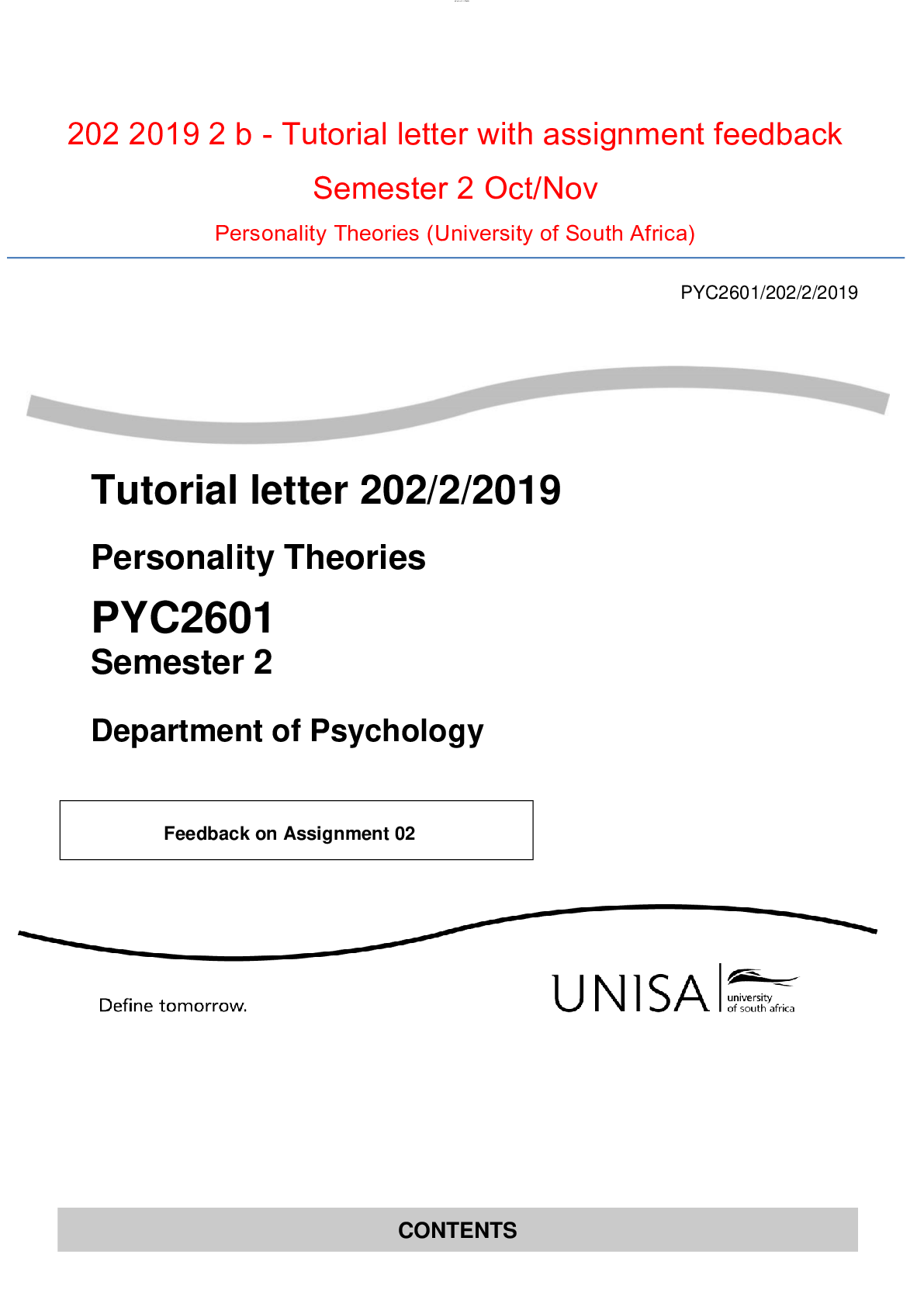
Buy this document to get the full access instantly
Instant Download Access after purchase
Buy NowInstant download
We Accept:

Reviews( 0 )
$8.00
Can't find what you want? Try our AI powered Search
Document information
Connected school, study & course
About the document
Uploaded On
Jul 30, 2020
Number of pages
11
Written in
Additional information
This document has been written for:
Uploaded
Jul 30, 2020
Downloads
0
Views
139

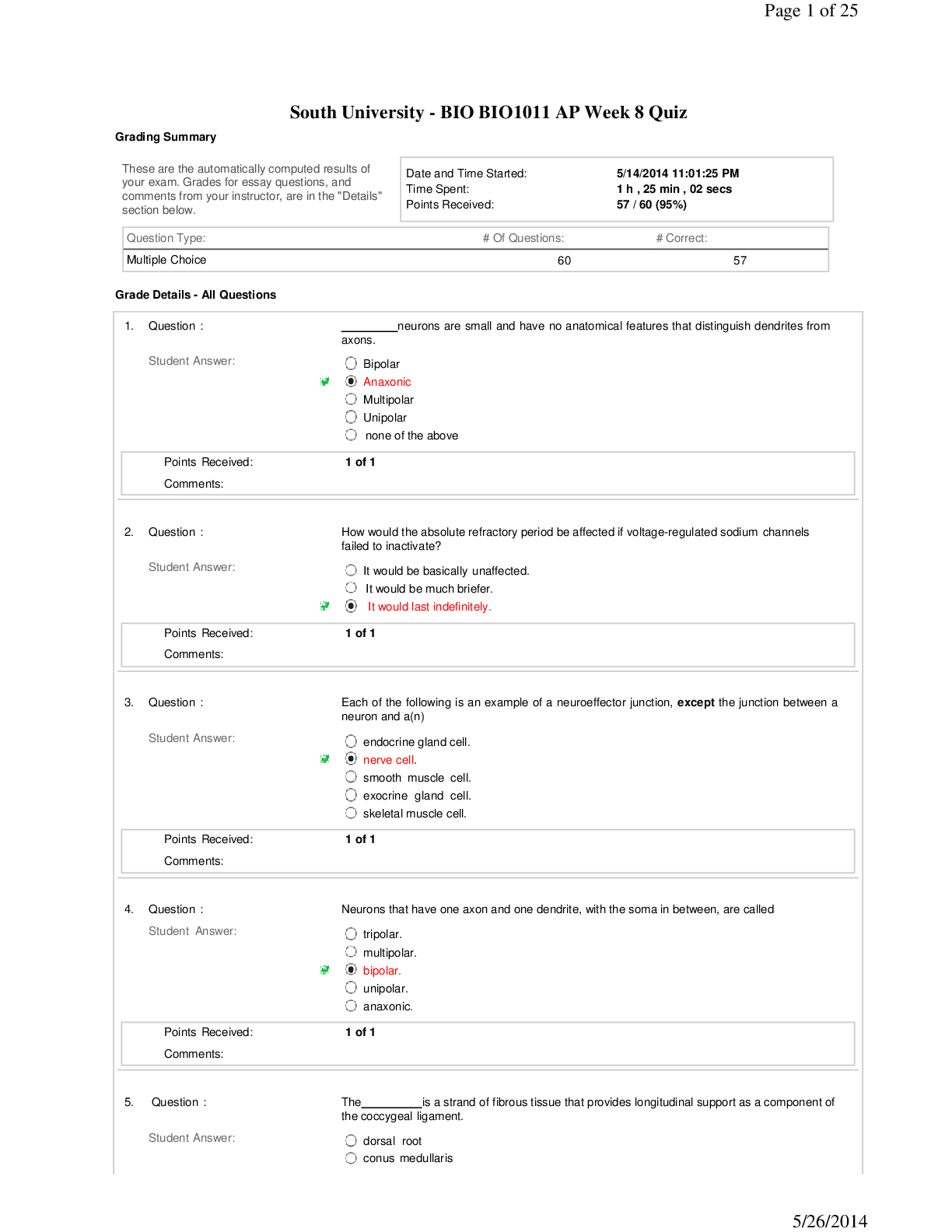
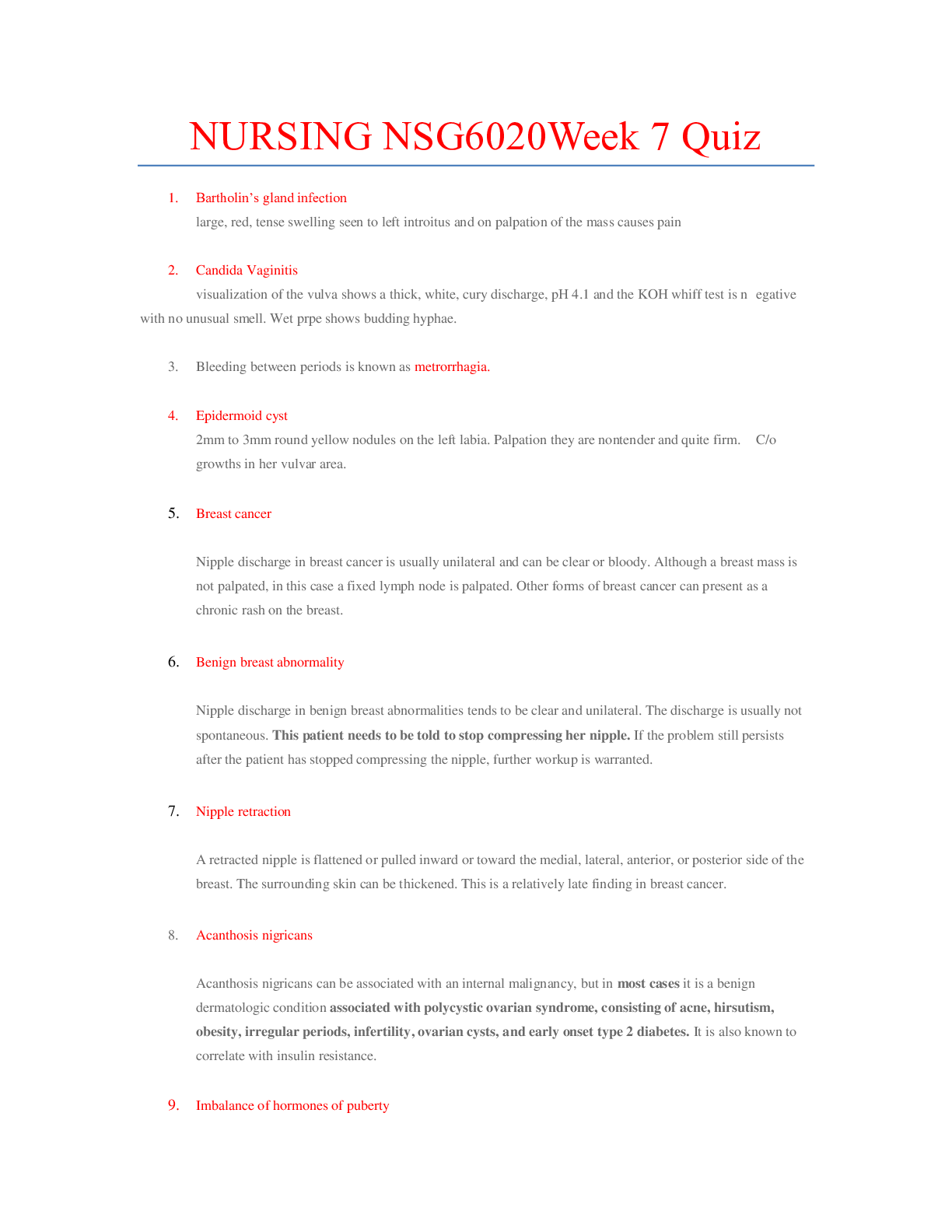
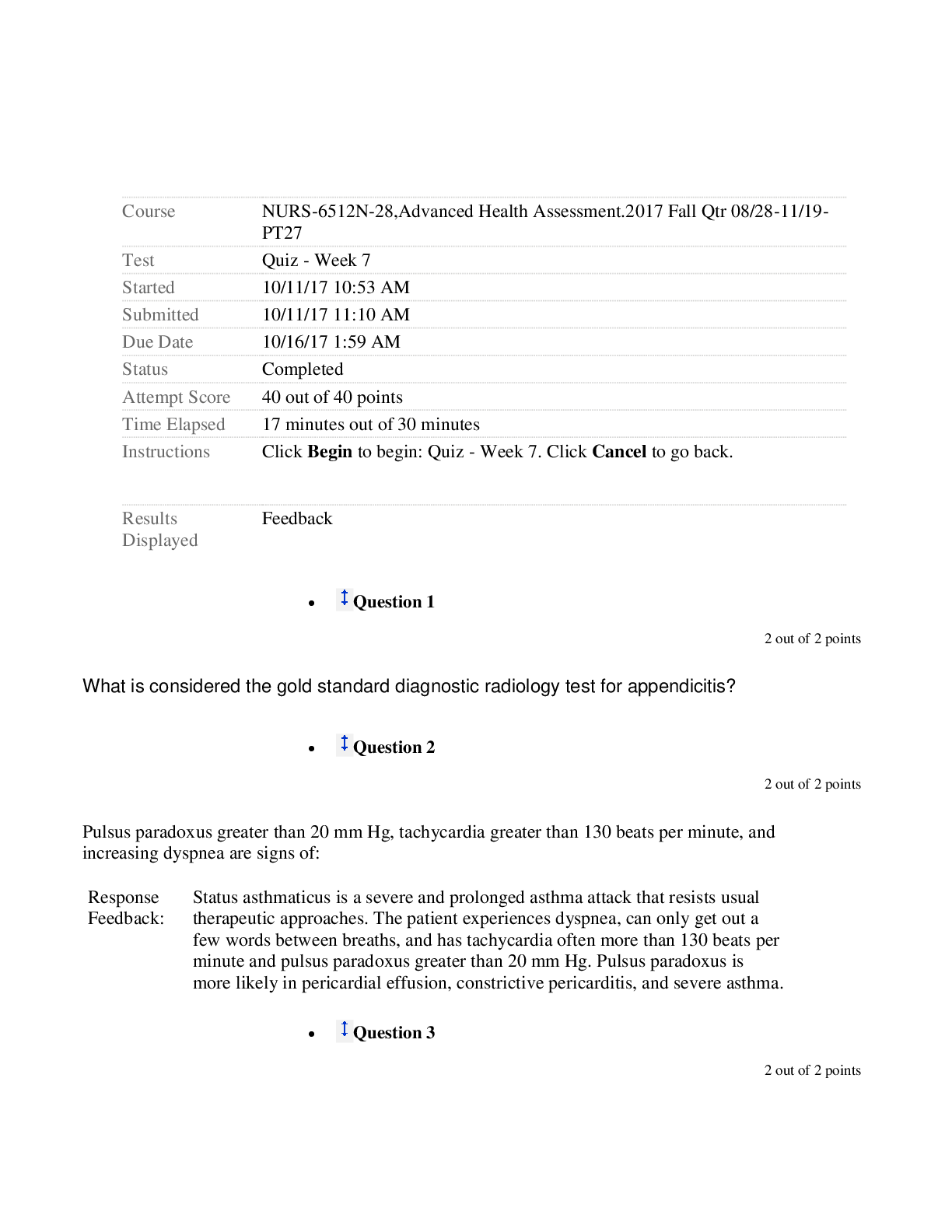



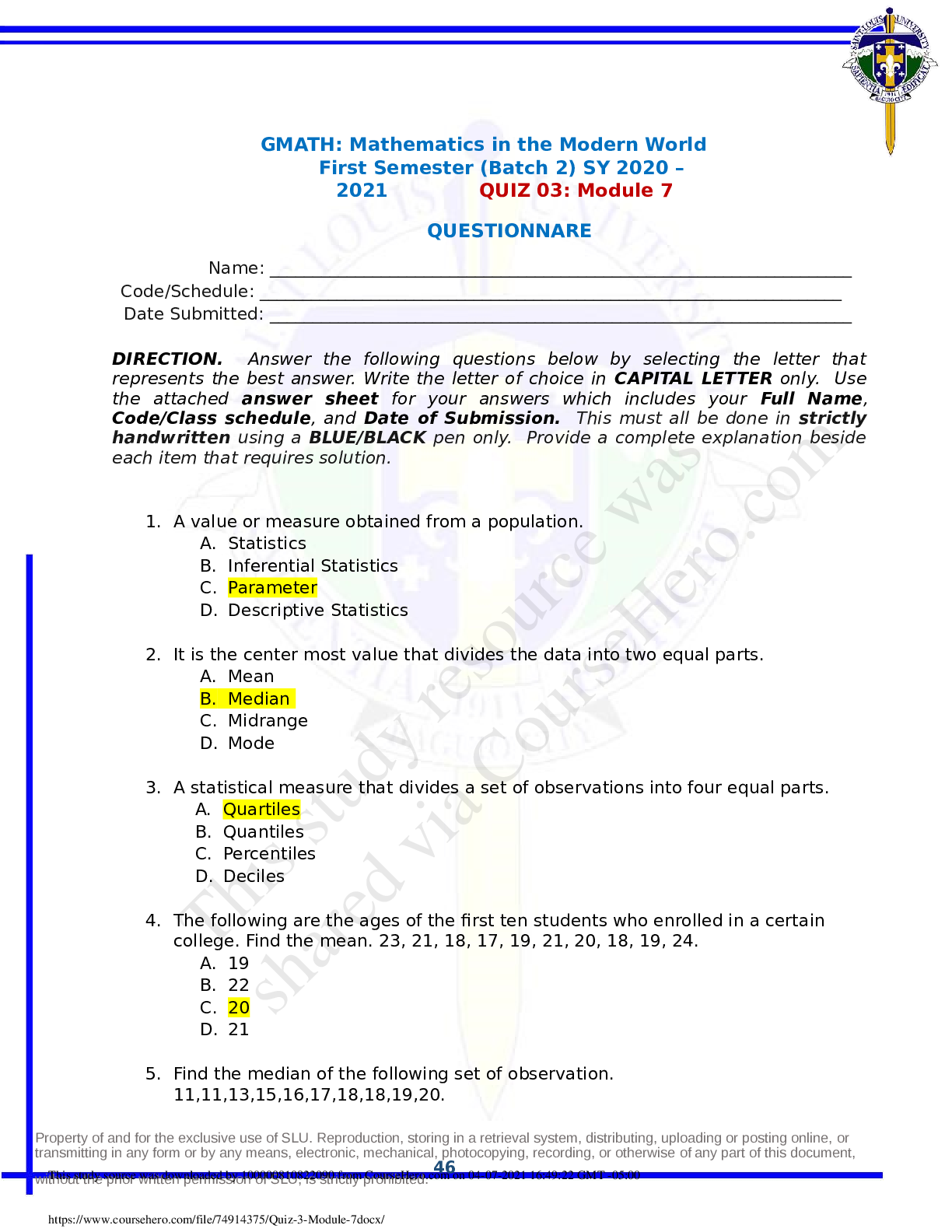



.png)

